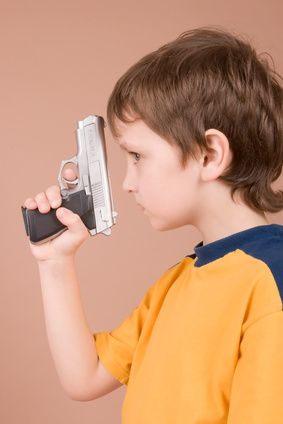
As a health and wellness advocate and life coach, I seldom speak out on political issues, preferring to affirm our unity rather than dwell on our differences. However, the second killing in weeks of a child by another child with a gun is quite a motivator.
Learning about the “Crickett” was the last straw. The Crickett is a child-sized rifle, just one of many on the market. It even comes in hot pink for little girls and has a multitude of accessories available, like story books and a beanie baby toting a mini-gun. It’s called “My First Rifle,” and for one 5-year-old in Kentucky who received it as a gift, the .22 caliber rifle was the cause of death for his 2-year-old sister when he accidentally shot her. Earlier that same week, a 5-year-old girl in Alaska was shot and killed by her 8-year-old brother.
The statistics about children and guns are quite horrifying. In 2010, over 15,000 children and teenagers sustained injuries from guns—more than three times the number of U.S. troops injured in the Afghanistan war. Across the country, guns kill twice as many children as cancer, five times more than heart disease, and 15 times more than infection, according to the New England Journal of Medicine. Since the horrific shooting of 20 elementary school children in Newtown, Conn., 58 children have been killed by guns. Considering that a third of all U.S. households have a gun, and half of those don’t lock up their guns, it’s surprising the number isn’t larger.
Then, there’s the trauma. Think of the 10-year-old boy in North Carolina who was killed when his father’s gun accidentally discharged while he was cleaning it. That father has to live with having killed his son. Or the guilt and shame that will haunt the children who accidentally killed their siblings or playmates, like the 4-year-old who shot and killed his 6-year-old friend. Or the parents of kids who wind up killing or injuring themselves while playing with a parent’s loaded gun, or commit suicide with that gun. My heart goes out to those children who have either killed or injured other children or adults, as well as to the families whose children either pulled the trigger or were shot down. That is far more guilt and horror than any adult or child should have to live with.
I have a question for those millions who are enamored with “the right to bear arms”: did our founding fathers envision a militia of 2-year-olds, 4-year-olds, 6-year-olds? Why are you giving these children access to guns?
Personal responsibility is a major concept in my work as a life coach. Having a gun demands a high level of parental responsibility. You are responsible for the life and death of your children, your neighbor’s children, your child’s schoolmates. No matter what laws the government manages to enact about gun control, if you own a gun, you are responsible for what happens with it—morally, if not legally. Parents who teach their young children to use firearms need to stress the importance of safety as well as teaching responsibility through their own example of keeping loaded guns safely locked away.
In the larger picture, however, it comes down to doing all we can to replace the fear-based consciousness that insists on needing guns for protection with the awareness that we really are all one, and that love is the greatest weapon we can wield.


